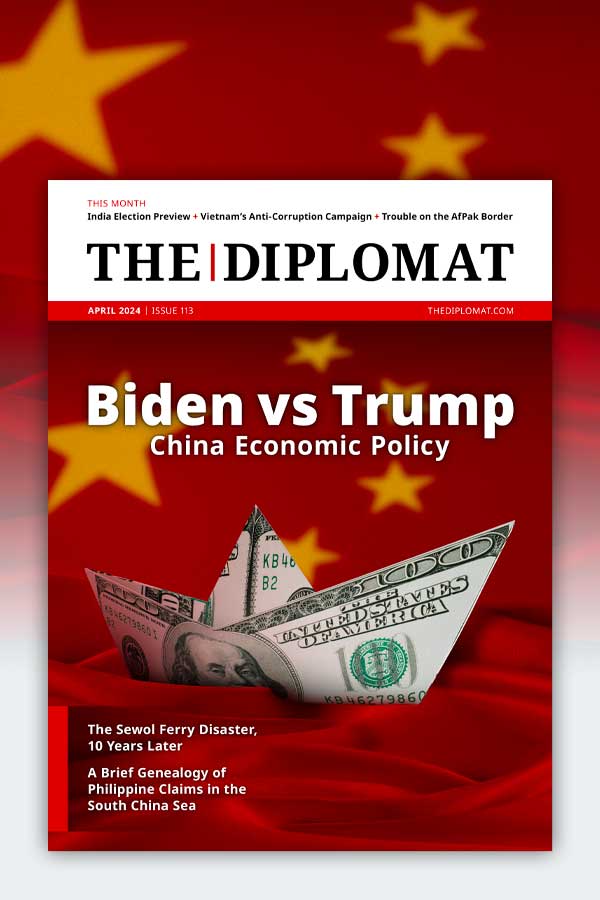| Welcome to the latest issue of Diplomat Brief. This week our top story explores how India-Pakistan tensions are combining with environmental issues to entangle fishermen from both countries. We also have an interview with scholar Christopher Jaffrelot on the “Gujarat model” and Modi’s rule of India. |
| Story of the week | ![[object Object]](https://thediplomat.com/diplomat-brief/2024/vol15/images/feature.jpg?v=1) | Diplomacy Caught in the Crossfire: India and Pakistan’s Fishing CommunitiesWhat Happened: Climate change, pollution, and urbanization are taking a heavy toll on the fishing communities of India and Pakistan. Like fishermen around the world, they are forced to sail farther and farther from shore to pursue smaller and smaller catches. However, Indian and Pakistani fishermen face a unique challenge: The tense relationship between their governments means that cases of inadvertent trespass across the maritime boundary can result in years of incarceration. Our Focus: Over 180 fishermen from India and over 100 from Pakistan are incarcerated in the other country, often for extended periods of time and with no communication with their families. Reporting from India’s Gujarat and Pakistan’s Sindh, respectively, journalists Safina Nabi and Kunwar Khuldune Shahid speak to relatives of fishermen jailed by the other country’s authorities. “He went fishing and never returned,” one Indian woman recounted of her husband’s arrest. “It was only later, through the boat owner, that I learned of his capture along with the boat. Since then, there has been a deafening silence – no phone calls, letters, or messages.” What Comes Next: The tense political relationship between India and Pakistan has precluded meaningful cooperation on climate change or fishery preservation – or even the specific issue of repatriating fishermen arrested by maritime security forces. Given the huge environmental and economic pressures already facing fishing communities, “The least both [Pakistan and India] governments can do is accommodate the fishermen from both sides,” fishermen’s advocate Ghulam Rasool Sheikh told The Diplomat. “The governments need to understand that when you are in the waters you don’t see any line dividing the two countries – all you see is your need to earn a living.” Read this story |
| Behind the News | INTERVIEW Christopher JaffrelotChristopher Jaffrelot, author of “Gujarat Under Modi: Laboratory of Today’s India,” on Prime Minister Narendra Modi’s relationship with the Hindu nationalist organization RSS: “Modi is a pure product of the RSS who, in contrast to most of his peers, emancipated himself from the organization rather early… Today, Modi dictates terms to the RSS more than the other way around – an unprecedented development.” Read the interview |
| This Week in Asia | Northeast Asia Japanese Prime Minister’s State Visit to the U.S.India is gearing up for its general elections, and that traditionally means a spike in jingoism as politicians jockey for advantage. Pakistan is a common target, but this time a comment from Indian Prime Minister Narendra Modi has riled Sri Lankans. Modi’s call to revisit the long-settled question of Sri Lanka’s sovereignty over a previously disputed island was aimed at a domestic audience, but risks needlessly undermining India’s standing in Sri Lanka at a time when New Delhi’s relationships with other neighbors like the Maldives and Nepal are under strain. Find out more | South Asia Key Myanmar Border Town Falls to ResistanceEthnic Karen rebels in eastern Myanmar this week seized control of the town of Myawaddy on the country’s border with Thailand, inflicting another humiliating defeat on the country’s military junta. The Karen National Union (KNU) claimed late last week that it had overrun a junta base at Thanganyinaung, around 10 kilometers to the west of Myawaddy. The KNU reported that 477 military personnel surrendered, while negotiations appear to be ongoing for the surrender of the garrison holding Myawaddy proper. The fall of the town, the most important of the six official border crossings between Myanmar and Thailand, is the latest in a string of major successes by the country’s diverse resistance forces. Given its proximity to Thailand, it is also one that could change the diplomatic dynamics of the conflict. Find out more | Southeast Asia Indonesia’s Prabowo Visits China, JapanIndonesia’s President-elect Prabowo Subianto paid a state visit to China this week, his first foreign trip since winning the presidential election in February. In a meeting with Chinese leader Xi Jinping, Prabowo praised the positive trajectory of China-Indonesia relations under President Joko Widodo, as did his host. While Prabowo visited Beijing in his official capacity as defense minister, the invitation was a clear attempt by China’s government to get relations with the incoming Indonesian administration on a good footing, well in advance of Prabowo’s inauguration in October. For his own part, the incoming Indonesian president is hoping, like his predecessor, to harness Chinese know-how to overhaul his country’s infrastructure and promote sustained economic growth. He’s slated to head to Japan next. Find out more | Central Asia World Shrinking for Tajik Passport HoldersIn the wake of the Crocus City Hall attack in Russia in late March, allegedly carried out by four Tajik citizens, Turkey announced this week that it would end the visa-free regime for Tajik passport holders that has been in place since 2018. Although Turkish authorities say the measure will only be temporary, the immediate effect is a shrinking of the world for Tajiks. Find out more |
| Visualizing APAC |  | Southeast Asian countries are aging as birthrates fall – a trend that will only speed up over the next 25 years. See the full picture |
| Word of the Week | Society KusturizatsiaDerived from the word for “vomiting” in Kyrgyz, kusturizatsia refers to the practice of forcing people suspected of corruption to pay compensation to the state in lieu of formal legal consequences. Find out more |
|  |
![[object Object]](https://thediplomat.com/diplomat-brief/2024/vol15/images/feature.jpg?v=1)

